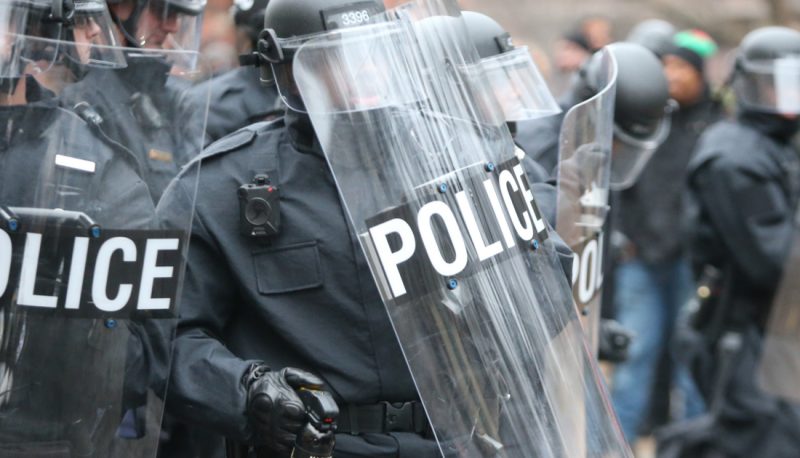“Confirmed Judges, Confirmed Fears” is a blog series documenting the harmful impact of President Trump’s judges on Americans’ rights and liberties. Cases in the series can be found by issue and by judge at this link.
Trump Ninth Circuit judge Kenneth Lee wrote a decision that reversed a district court judgment upholding the dismissal from a SWAT team of a police officer who made a public statement that was construed as advocating the unnecessary use of violence by police in apprehending a suspect. The January 2021 decision was in Moser v Las Vegas Metropolitan Police Department.
Charles Moser is a Las Vegas Metro police officer who was a sniper on the department’s SWAT team. In 2015, when he learned that Metro police peacefully arrested someone who was suspected of shooting a police officer, Moser praised the suspect’s capture on Facebook and commented “It’s a shame he didn’t have a few holes in him.” Although Moser was off duty at the time, Metro’s Internal Affairs unit was informed about the comment and began an investigation.
When questioned, Moser admitted that the posting was “completely inappropriate” and had removed it, and claimed that he was intending to express his “frustration” that the officer who was shot was not able to “defend himself.”
Metro decided to transfer Moser from the SWAT team and put him back on patrol. They concluded that the post indicated that he had become “a little callous to killing,” and noted that he had violated a department policy on public posting on social media. SWAT officers, his supervisors noted, are generally “held to a higher standard” because of the stressful situations they may be in and the need to have the confidence of the public. Metro denied a grievance filed by Moser, finding that regardless of his intent, the public comment would “tend to negatively impact the Department’s ability to serve the public” and “impede the performance” of his duties in SWAT so that he was no longer effective in that assignment.
Moser filed suit against Metro and his supervisors, claiming that the transfer violated his right to free speech under the First Amendment. All parties agreed that the court should evaluate the claim under the Supreme Court’s well-established Pickering standard, under which a public employee’s interest in speaking on a matter of public concern is balanced against the government’s interests in employee discipline. After discovery and motions by the parties, the parties each moved for summary judgment. The district court granted summary judgment against Moser. The judge explained that Moser had only a “moderate” free speech interest in his post, which was outweighed by Metro’s concern that it would be seen as “advocating unlawful violence” by police and could thus lead to lack of public confidence in the SWAT team and questioning of Moser’s fitness as a SWAT officer.” Moser appealed.
Trump Ninth Circuit judge Lee wrote a 2-1 decision reversing the district court. According to Lee, there was a genuine “factual dispute” about the subjective and “objective meaning” of Moser’s comment, and about the effect of that comment. Lee maintained that Moser’s comment could have been intended and understood as simply expressing “frustration – in an admittedly hyperbolic and inappropriate manner – at the perils of police officers being struck down in the line of duty.” Particularly because the meaning of Moser’s post was “ambiguous,” Lee went on, Metro had not provided enough evidence to support a “reasonable prediction” that disruption or other harm would result from Moser’s post. The court thus sent the case back to the district court, in order to mandate a jury trial at least on the factual issues.
Judge Marsha Berzon firmly dissented. She pointed out that in the court below, Moser had “conceded” several times that there was “no genuine issue of material fact” about the “meaning of his comment” on Facebook. In particular, he did not disagree that the post “conveyed” that he “wanted his fellow officers to shoot (and possibly kill) the suspect, regardless of whether” deadly or other force was “justified”, and that this was a reasonable understanding of what he said. Despite Lee’s assertion, Berzon went on, the majority had failed to show how evidence of Moser’s “private, subjective meaning” can make his public comment “objectively ambiguous.”
In addition, Berzon continued, Lee’s opinion failed to properly address whether “Metro’s interpretation” of Moser’s comments “was reasonable, the touchstone of the Pickering balancing test. Under applicable precedent, Berzon pointed out, courts are required to give “substantial weight” to a public employer’s “reasonable predictions” of disruption or other problems on the job as a result of an employee’s statements. Regardless of Moser’s subjective intent, Berzon stated, the reasonable understanding was that he was “harboring and communicating” the view and attempting to “sanction the use of unnecessary force,” which Metro reasonably concluded was a “serious impediment to performance of the duties of a SWAT officer.”
Judge Berzon’s conclusion concerning the dangers of Trump judge Lee’s holding is worth quoting in full:
“[W]hat the majority holds is that a police department may have to retain on its SWAT squad an officer who appears to support the unnecessary use of force in the capture of a suspect in a police shooting. I do not for a minute doubt that protecting the First Amendment right of public employees to contribute to the public dialogue on issues of public importance is of critical importance to our ongoing experiment in self-government. But we are living in a time when, driven by public concern, police departments nationwide are engaged in self-examination concerning how best to curb the use of excessive force by police officers as they carry out law enforcement’s critical role. Tying the hands of those departments in making personnel decisions based on reasonable evaluations of those officers’ ability to make measured judgments about the use of force— especially where, as here, the decision concerns an elite officer entrusted with high-caliber weapons and particularly dangerous assignments—can only stand in the way of these efforts.”

